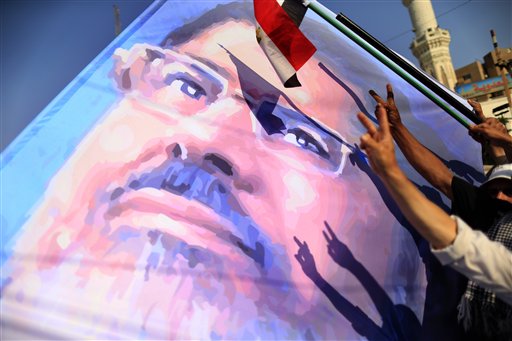Samuel Tadros, a Research Fellow at the Hudson Institute specializing in Islamist movements, told a seminar at the Hoover Institution that the most important reason for the rapid collapse of the Muslim Brotherhood government in Egypt is that the organization had no plan for power and a “complete lack of experience in managing anything.” Their lack of vision and competence caught Egyptians by surprise.
Tadros noted that the Muslim Brotherhood had established an ill-deserved reputation for discipline because of its internal rules for admission and advancement. In the end, he said, all that the Brotherhood created was an institutional culture of conformity. That, combined with an endemic Egyptian affinity for conspiracy theories, led many Egyptians to speculate that the Brotherhood were colluding with various foreign plots.
In contrast, he said, a new and bizarre cult of personality has arisen around the leaders of the Egyptian military, and General Abdul Fatah Saeed Hussein Khalil al-Sisi, who led the coup. Moreover, Tadros observed that Sisi had turned to a surviving aide of Gamal Abdel Nasser, Egypt’s previous dictator (and enemy of the Brotherhood), to write the ultimatum that had been handed to President Mohamed Morsi.
That, he said, underlined the fact that the army may be as incompetent as the government it replaced, having failed to manage the 2011 transition and in the process of bungling the new one. The military had, for example, ruled for several days before realizing it had neglected to dissolve the Egyptian parliament. Moreover, it was incapable of enacting the structural reforms necessary to save Egypt’s economy.
When Hosni Mubarak fell, the system he was managing had already failed. The Brotherhood did not have an alternative plan–and still does not, Tadros says, other than abstract pledges of martyrdom. It could either make an attempt to rehabilitate itself within a secularist system, as Turkey’s Islamist party did, or it could opt instead for jihad, turning away from their failed attempt to win and secure power through democracy.
As for the Egypt’s liberal, modernist minority, they have returned to an old model of “using the state’s coercive measures in order to force those ignorant masses” to “see the light,” Tadros says. So for the moment, Egypt is doomed to oscillate between military rule and populist revolution–even as it faces economic crisis and the disappointment of the hopes that once, and again, animated Tahrir Square.
Meanwhile, Tadros concluded, the U.S. had very little leverage–except serving as the symbolic enemy of all sides in the conflict. The threat of withdrawing U.S. aid could be a potent one, but was discounted by the Egyptian military, which views itself as entitled to aid due to its enforcement of the 1979 peace treaty with Israel. The danger was that the U.S. does not actually have a policy toward the region, he said.

COMMENTS
Please let us know if you're having issues with commenting.